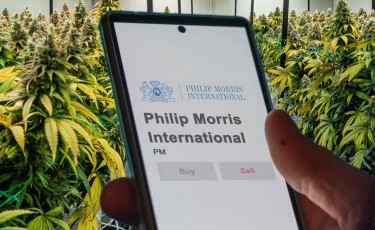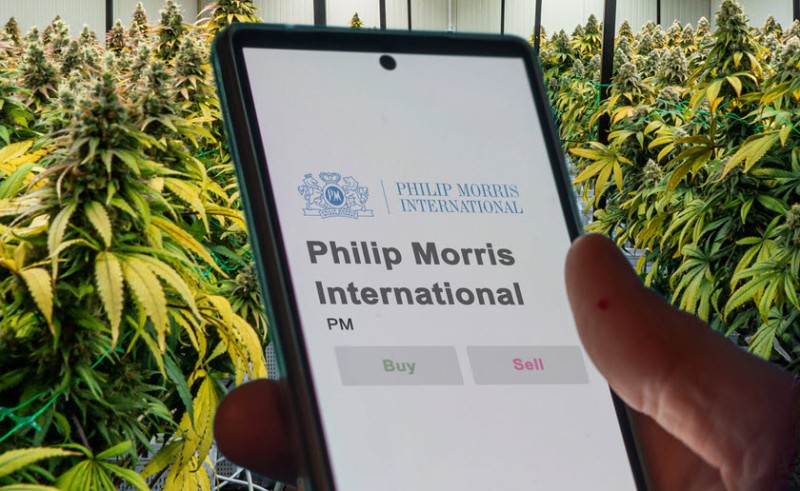
The World’s Biggest Tobacco Company Is Quietly Entering The Weed Industry
What Does This Mean For The Future Of Weed?
From the 1950’s to the 1990’s, cigarettes were considered to be a ‘cool’ habit and somewhat of a fashion accessory globally.
There was even a time when Hollywood celebrities were photographed smoking, which made them seem like the epitome of sophistication. Big names including Humphrey Bogart and James Dean were pictured smoking, but it was also so common and accepted around the world. That did not last long, as eventually evidence that cigarettes killed people from cancer and other fatal health conditions became impossible to ignore.
While there were many names in Big Tobacco that helped popularize the consumption of cigarettes, and made it easy for people to get access to it, Philip Morris International (PMI) were one of the biggest players – and they still are, to this day. They own some of the most common cigarette brands that are consumed around the world, including Marlboro, Chesterfield, and L&M. Surely, one can blame PMI’s products for tempting people to make poor health choices that may have taken them to the grave…
According to the World Health Organization, tobacco smoking is responsible for the deaths of around 8 million people globally.
Yet, with the rise of cannabis, PMI wanted a piece of the pie.
The History Of Philip Morris’ Interests In Cannabis
If you’re only hearing about Big Tobacco’s interest in cannabis right now, you might be shocked to learn that their interest in weed goes as far back as 1969. There are some internal documents that prove PMI was interested in learning about the potential of cannabis. However, they were considering weed a competitor as well as a potential product.
In fact, a 1970 memo even shows that PMI acknowledges the possibility of marijuana legalization.
Fast forward to 2016, when PMI made a significant investment worth $20 million to an Israeli biotech firm specializing in medical cannabis, called Syqe Medical. At the time, Syqe was working on developing a medical marijuana inhaler which would provide metered dosing of weed for medical patients. According to the deal, Syqe Medical will also work on developing certain technologies that would enable Philip Morris to minimize the health effects caused by smoking.
By 2023, Philip Morris made a deal to acquire Syqe Medical for a cool $650 million, as long as there were certain conditions met. In a report by Calcalist, the deal features a number of milestones, though the bottom line is that if the inhaler developed by Syqe passes the clinical trials, PMI will then go ahead to buy all shares of the company for the aforementioned amount.
Another Silent Move Into The Weed Space
More recently, in January 2025, a press release was published detailing Vectura Fertin Pharma’s (VFP), a subsidiary of Philip Morris International, joint venture with a Canadian biotech firm focusing on cannabinoid-based drugs – Avicanna.
According to the press release, the joint venture seeks to promote cannabis accessibility and research. Avicanna already has a stronghold in the wellness sector. However, the press release hardly makes any other mention about the involvement of Philip Morris International, but it’s clear that Big Tobacco has long had their eye in the cannabis industry. Back in 2016, when they first got involved with Syqe Medical, it highlighted the firm’s interest in wellness, but the partnership with Avicanna cements that.
Changes In Consumer Perception And Habits
It only makes sense for Big Tobacco to pivot to cannabis – or wellness, in general. After all, if you can’t beat em, join em!
And it’s clear: for several years now, there has been a decrease in cigarette smoking; young adults are now shifting from tobacco, as well as alcohol, and increasing their cannabis consumption instead.
And Philip Morris isn’t the only player in Big Tobacco who’s expressed an interest in a slice of the (weed) pie. Back in 2017, American holding company Altria Group began moving away from cigarettes, with their $1.8 billion investment into the Cronos Group, a large Canadian cannabis company. Altria owns several big American companies including Philip Morris; so much so, that even their website now declares the tagline: “Moving Beyond Smoking”.
However, Altria faced issues due to regulatory concerns.
British American Tobacco (BAT) has also been interested in cannabis. For some time now, they’ve been researching weed products, particularly infusing CBD and THC into their electronic cigarettes which are sold under the Vuse and Vype brand names. In 2021, BAT began a trial launch of CBD products in the United Kingdom.
RJ Reynolds, which is also now under British American Tobacco, has also considered joining the weed industry. According to internal documents, RJ Reynolds has considered cannabis both an opportunity and a competitor as far back as the 1970s.
Conclusion
At the end of the day, cannabis isn’t a real threat to the tobacco industry. The tobacco industry simply shot itself on the foot – all it needed was time, to prove that it does indeed cause cancer and kill people. On the other hand, cannabis was a friend more than a foe: legalization and a growing consumption of weed proved its ability to save lives.
That said, the relationship between tobacco and weed continues to evolve. Through cannabis legalization, Big Tobacco can learn from the challenges and opportunities that cannabis had to go through. It can be said that one thing is clear, though: the drop in tobacco consumption is a major opportunity for cannabis, with more people looking to substitute tobacco with a healthier alternative.
As a response, we may continue to see tobacco companies investing in Big Cannabis – just as we’ve seen in the examples mentioned above. This partnership is fantastic news for both industries, and we can only hope to see more!
PHILIP MORRIS' MOVES IN CANNABIS, READ ON...
WHY DID PHILIP MORRIS JUST BUY A MEDICAL MARIJUANA INHALER COMPANY?







